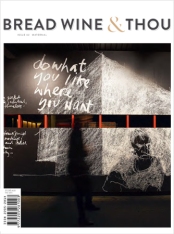 In the most recent issue of the wonderful Bread Wine & Thou is a beautifully written piece by Melbourne writer Ramona Barry. In it she recounts her journey with cancer and its impact upon her family’s life at the table. It is an extraordinarily moving piece, and there is really nothing to do but go and read it.
In the most recent issue of the wonderful Bread Wine & Thou is a beautifully written piece by Melbourne writer Ramona Barry. In it she recounts her journey with cancer and its impact upon her family’s life at the table. It is an extraordinarily moving piece, and there is really nothing to do but go and read it.
In the midst of Barry’s piece is this little ode to the virtues of the home cook and her capacity, even in the midst of life at its worst, to hold a family together through the most menial practice of memory in the kitchen.
Nostalgia can play an important part in professional cooking. Just look to Heston Blumenthal trying to recreate summer holidays with his now famously sensorial dish ‘Sounds of the Sea’. On the flip side it is memory that the domestic cook relies on, day in and day out.
Memory helps to get food on the table in a timely manner and take into account everyone’s dietary requirements. These are the details that you need to learn intuitively and over time. There is no explaining to the non-cooks in the family that to do a proper roast dinner you must start preparing at 4pm to get it on the table by 7pm. Nothing is more frustrating than watching kitchen interlopers swanning in at 6.30 and expecting their lamb shanks with the nightly news.
Memory allows you to be able to cook dinner as a staggered meal, taking into account after-school activities, late meetings and extra guests. You need to be able to throw a meal together when the entire family has collapsed on the couch after a road trip, or half of them are in bed with the flu. You rely on memory to manage the juggling act seamlessly and daily.
Barry’s words are a gentle reminder of the primacy of the home cook in the civilisation of our lives. The domestic matters. It reminds me of the thesis of Michael Symon’s masterful The Pudding that Took a Thousand Cooks, in which he demonstrates the oft unrecognised role of the household cook.
Cooks have always been in the background—both ever present and unnoticed. Their contributions have seemed too common, pervasive, trivial, unproblematic. Cooks generally have been women, and their achievements overlooked as inglorious and private. They have been restricted to the chopping-board and spice rack. But while each of the cooks’ actions might be infinitesimal, the results have multiplied into civilization.’
Ramona Barry, “An Extra Place at the Table” in Bread Wine & Thou, issue 2, 2016, 86-95.
Michael Symons, The Pudding that Took a Thousand Cooks: The Story of Cooking in Civilisation and Daily Life, Viking, 1998.
Artwork: Jonathan Leaman, ‘A Jan Steen Kitchen’, 1995.